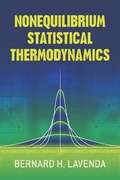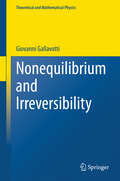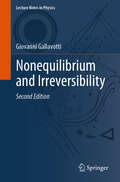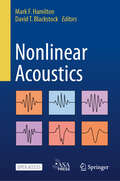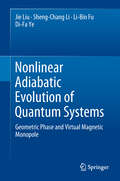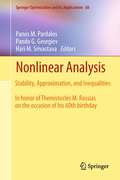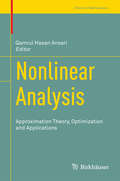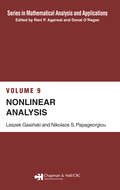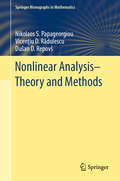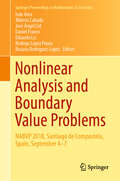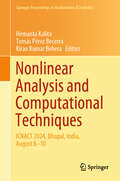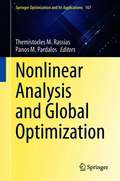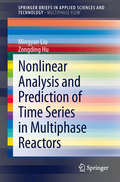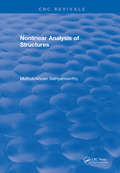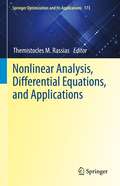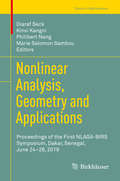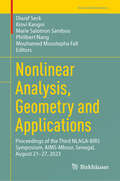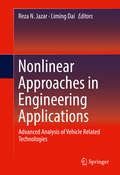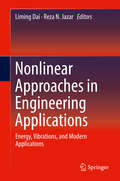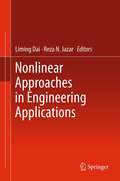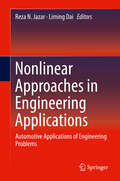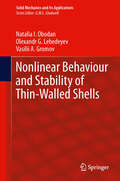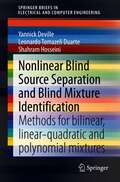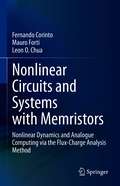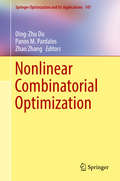- Table View
- List View
Nonequilibrium Statistical Thermodynamics (Dover Books on Physics)
by Bernard H. LavendaThis book develops in detail the statistical foundations of nonequilibrium thermodynamics, based on the mathematical theory of Brownian motion. Author Bernard H. Lavenda demonstrates that thermodynamic criteria emerge in the limit of small thermal fluctuations and in the Gaussian limit where means and modes of the distribution coincide. His treatment assumes the theory of Brownian motion to be a general and practical model of irreversible processes that are inevitably influenced by random thermal fluctuations. This unifying approach permits the extraction of widely applicable principles from the analysis of specific models.Arranged by argument rather than theory, the text is based on the premises that random thermal fluctuations play a decisive role in governing the evolution of nonequilibrium thermodynamic processes and that they can be viewed as a dynamic superposition of many random events. Intended for nonmathematicians working in the areas of nonequilibrium thermodynamics and statistical mechanics, this book will also be of interest to chemical physicists, condensed matter physicists, and readers in the area of nonlinear optics.
Nonequilibrium and Irreversibility
by Giovanni GallavottiThis book concentrates on the properties of the stationary states in chaotic systems of particles or fluids, leaving aside the theory of the way they can be reached. The stationary states of particles or of fluids (understood as probability distributions on microscopic configurations or on the fields describing continua) have received important new ideas and data from numerical simulations and reviews are needed. The starting point is to find out which time invariant distributions come into play in physics. A special feature of this book is the historical approach. To identify the problems the author analyzes the papers of the founding fathers Boltzmann, Clausius and Maxwell including translations of the relevant (parts of) historical documents. He also establishes a close link between treatment of irreversible phenomena in statistical mechanics and the theory of chaotic systems at and beyond the onset of turbulence as developed by Sinai, Ruelle, Bowen (SRB) and others: the author gives arguments intending to support strongly the viewpoint that stationary states in or out of equilibrium can be described in a unified way. In this book it is the "chaotic hypothesis", which can be seen as an extension of the classical ergodic hypothesis to non equilibrium phenomena, that plays the central role. It is shown that SRB - often considered as a kind of mathematical playground with no impact on physical reality - has indeed a sound physical interpretation; an observation which to many might be new and a very welcome insight. Following this, many consequences of the chaotic hypothesis are analyzed in chapter 3 - 4 and in chapter 5 a few applications are proposed. Chapter 6 is historical: carefully analyzing the old literature on the subject, especially ergodic theory and its relevance for statistical mechanics; an approach which gives the book a very personal touch. The book contains an extensive coverage of current research (partly from the authors and his coauthors publications) presented in enough detail so that advanced students may get the flavor of a direction of research in a field which is still very much alive and progressing. Proofs of theorems are usually limited to heuristic sketches privileging the presentation of the ideas and providing references that the reader can follow, so that in this way an overload of this text with technical details could be avoided.
Nonequilibrium and Irreversibility (Lecture Notes in Physics #1040)
by Giovanni GallavottiThis 2nd edition of the book focuses on the properties of stationary states in chaotic systems of particles or fluids, setting aside the theory of how these states are achieved. The second edition has been thoroughly revised and includes numerous corrections. It incorporates recent findings, with particular emphasis on the equivalence between irreversible and reversible equations. The ongoing debate over reversibility and irreversible behavior is frequently discussed. The book seeks to unify the study of stationary nonequilibrium states with that of equilibrium states, using the paradigm offered by the simplest chaotic systems, specifically Anosov systems. The book begins by exploring the time-invariant distributions relevant to physics. A distinctive feature of this work is its historical approach. To clarify foundational issues, the author analyzes the works of pioneering figures like Boltzmann, Clausius, and Maxwell, including translated excerpts of key historical documents. Additionally, the author establishes a close connection between the treatment of irreversible phenomena in statistical mechanics and the theory of chaotic systems, particularly at and beyond the onset of turbulence, as developed by Sinai, Ruelle, and Bowen (SRB) and others. Arguments are presented to strongly support the perspective that stationary states, whether in equilibrium or not, can be described in a unified framework. The book offers extensive coverage of contemporary research, presented in sufficient detail to give advanced students a sense of the ongoing research directions in this dynamic field. Proofs of theorems are generally limited to heuristic outlines, favoring the presentation of concepts and providing references for further study, thereby avoiding an overload of technical detail in the main text.
Nonlinear Acoustics
by Mark F. Hamilton David T. BlackstockThis open access book is an introductory text on the theory of nonlinear acoustics authored by experts on their respective topics. It is written at a level appropriate for a graduate course on nonlinear acoustics, and it also serves as a useful resource for scientists and engineers. Consistent notation is employed for the principal symbols, and there is extensive cross-referencing between chapters. Chapters 1 through 8 develop the physical concepts, mathematical models, and classical methods of solution that form the theoretical framework for nonlinear acoustics. These chapters, or selected portions, form an appropriate core for an introductory course. While the emphasis is on nonlinear sound waves in fluids, Chapter 9 provides an introduction to nonlinear elastic waves in isotropic solids. Chapters 10 through 15 cover applications and additional methodologies encountered in nonlinear acoustics that include perturbation and numerical methods, ray theory for inhomogeneous moving media, statistical and parametric phenomena, and biomedical applications. The book is relevant to studies of therapeutic ultrasound, blast waves and jet noise, nondestructive testing, parametric array loudspeakers, particle manipulation with acoustic radiation force, and other applications involving nonlinear acoustics. This is an open access book.
Nonlinear Adiabatic Evolution of Quantum Systems: Geometric Phase and Virtual Magnetic Monopole
by Jie Liu Sheng-Chang Li Li-Bin Fu Di-Fa YeThis book systematically introduces the nonlinear adiabatic evolution theory of quantum many-body systems. The nonlinearity stems from a mean-field treatment of the interactions between particles, and the adiabatic dynamics of the system can be accurately described by the nonlinear Schrödinger equation. The key points in this book include the adiabatic condition and adiabatic invariant for nonlinear system; the adiabatic nonlinear Berry phase; and the exotic virtual magnetic field, which gives the geometric meaning of the nonlinear Berry phase. From the quantum-classical correspondence, the linear and nonlinear comparison, and the single particle and interacting many-body difference perspectives, it shows a distinct picture of adiabatic evolution theory. It also demonstrates the applications of the nonlinear adiabatic evolution theory for various physical systems. Using simple models it illustrates the basic points of the theory, which are further employed for the solution of complex problems of quantum theory for many-particle systems. The results obtained are supplemented by numerical calculations, presented as tables and figures.
Nonlinear Analysis
by Panos M. Pardalos Hari M. Srivastava Pando G. GeorgievThe volume will consist of about 40 articles written by some very influential mathematicians of our time and will expose the latest achievements in the broad area of nonlinear analysis and its various interdisciplinary applications.
Nonlinear Analysis
by Qamrul Hasan AnsariMany of our daily-life problems can be written in the form of an optimization problem. Therefore, solution methods are needed to solve such problems. Due to the complexity of the problems, it is not always easy to find the exact solution. However, approximate solutions can be found. The theory of the best approximation is applicable in a variety of problems arising in nonlinear functional analysis and optimization. This book highlights interesting aspects of nonlinear analysis and optimization together with many applications in the areas of physical and social sciences including engineering. It is immensely helpful for young graduates and researchers who are pursuing research in this field, as it provides abundant research resources for researchers and post-doctoral fellows. This will be a valuable addition to the library of anyone who works in the field of applied mathematics, economics and engineering.
Nonlinear Analysis (Mathematical Analysis and Applications)
by Leszek Gasinski Nikolaos S. PapageorgiouNonlinear analysis is a broad, interdisciplinary field characterized by a remarkable mixture of analysis, topology, and applications. Its concepts and techniques provide the tools for developing more realistic and accurate models for a variety of phenomena encountered in fields ranging from engineering and chemistry to economics and biology.Thi
Nonlinear Analysis - Theory and Methods (Springer Monographs in Mathematics)
by Nikolaos S. Papageorgiou Vicenţiu D. Rădulescu Dušan D. RepovšThis book emphasizes those basic abstract methods and theories that are useful in the study of nonlinear boundary value problems. The content is developed over six chapters, providing a thorough introduction to the techniques used in the variational and topological analysis of nonlinear boundary value problems described by stationary differential operators. The authors give a systematic treatment of the basic mathematical theory and constructive methods for these classes of nonlinear equations as well as their applications to various processes arising in the applied sciences. They show how these diverse topics are connected to other important parts of mathematics, including topology, functional analysis, mathematical physics, and potential theory. Throughout the book a nice balance is maintained between rigorous mathematics and physical applications. The primary readership includes graduate students and researchers in pure and applied nonlinear analysis.
Nonlinear Analysis and Boundary Value Problems: NABVP 2018, Santiago de Compostela, Spain, September 4-7 (Springer Proceedings in Mathematics & Statistics #292)
by Alberto Cabada Iván Area José Ángel Cid Daniel Franco Eduardo Liz Rodrigo López Pouso Rosana Rodríguez-LópezThis book is devoted to Prof. Juan J. Nieto, on the occasion of his 60th birthday. Juan José Nieto Roig (born 1958, A Coruña) is a Spanish mathematician, who has been a Professor of Mathematical Analysis at the University of Santiago de Compostela since 1991. His most influential contributions to date are in the area of differential equations. Nieto received his degree in Mathematics from the University of Santiago de Compostela in 1980. He was then awarded a Fulbright scholarship and moved to the University of Texas at Arlington where he worked with Professor V. Lakshmikantham. He received his Ph.D. in Mathematics from the University of Santiago de Compostela in 1983. Nieto's work may be considered to fall within the ambit of differential equations, and his research interests include fractional calculus, fuzzy equations and epidemiological models. He is one of the world’s most cited mathematicians according to Web of Knowledge, and appears in the Thompson Reuters Highly Cited Researchers list. Nieto has also occupied different positions at the University of Santiago de Compostela, such as Dean of Mathematics and Director of the Mathematical Institute. He has also served as an editor for various mathematical journals, and was the editor-in-chief of the journal Nonlinear Analysis: Real World Applications from 2009 to 2012. In 2016, Nieto was admitted as a Fellow of the Royal Galician Academy of Sciences. This book consists of contributions presented at the International Conference on Nonlinear Analysis and Boundary Value Problems, held in Santiago de Compostela, Spain, 4th-7th September 2018. Covering a variety of topics linked to Nieto’s scientific work, ranging from differential, difference and fractional equations to epidemiological models and dynamical systems and their applications, it is primarily intended for researchers involved in nonlinear analysis and boundary value problems in a broad sense.
Nonlinear Analysis and Computational Techniques: ICNACT 2024, Bhopal, India, August 8–10 (Springer Proceedings in Mathematics & Statistics #501)
by Hemanta Kalita Tomás Pérez Becerra Kiran Kumar BeheraThis book contains proceedings of select chapters presented at the International Conference on Nonlinear Analysis & Computational Techniques (ICNACT-2024), held at VIT Bhopal University, Madhya Pradesh, India, from 8 to 10 August 2024. It discusses advances, emerging trends and theoretical developments in topics related to nonlinear analysis and computational techniques, including the introduction to new function spaces, such as a generalized Orlicz with Rao and Ren&’s norm, the s-Young space and the controlled G-metric spaces. The book explains some relationships among different types of near linear spaces and introduces the strongly λ-summable functions. Nonlinear systems frequently require convergence and fixed point theorems. In this sense, the concept of q-lacunary almost statistical convergence is exposed. The book proposes a common coupled fixed point theorems, a few fixed point theorems for compatible mappings of type P and some applications on dynamic programming. In differential equations, some works extend Ostrowski-type inequalities; solution of the fractal nonlinear Klein–Gordon equation, study of a hybrid differential equation and the problem of exponential stability of the nonlinear Saint–Venant equation, finally provides a study of some properties for Cayley transform of operators. The book is useful to researchers in mathematics and applied sciences, engineers, graduate students, computational scientists, software developers and educators. They will benefit from this theory, which is essential for efficiently solving complex equations via the understanding, modeling and solving nonlinear problems and their theoretical and practical domains.
Nonlinear Analysis and Global Optimization (Springer Optimization and Its Applications #167)
by Panos M. Pardalos Themistocles M. RassiasThis contributed volume discusses aspects of nonlinear analysis in which optimization plays an important role, as well as topics which are applied to the study of optimization problems. Topics include set-valued analysis, mixed concave-convex sub-superlinear Schroedinger equation, Schroedinger equations in nonlinear optics, exponentially convex functions, optimal lot size under the occurrence of imperfect quality items, generalized equilibrium problems, artificial topologies on a relativistic spacetime, equilibrium points in the restricted three-body problem, optimization models for networks of organ transplants, network curvature measures, error analysis through energy minimization and stability problems, Ekeland variational principles in 2-local Branciari metric spaces, frictional dynamic problems, norm estimates for composite operators, operator factorization and solution of second-order nonlinear difference equations, degenerate Kirchhoff-type inclusion problems, and more.
Nonlinear Analysis and Prediction of Time Series in Multiphase Reactors
by Mingyan Liu Zongding HuThis book reports on important nonlinear aspects or deterministic chaos issues in the systems of multi-phase reactors. The reactors treated in the book include gas-liquid bubble columns, gas-liquid-solid fluidized beds and gas-liquid-solid magnetized fluidized beds. The authors take pressure fluctuations in the bubble columns as time series for nonlinear analysis, modeling and forecasting. They present qualitative and quantitative non-linear analysis tools which include attractor phase plane plot, correlation dimension, Kolmogorov entropy and largest Lyapunov exponent calculations and local non-linear short-term prediction.
Nonlinear Analysis of Structures (CRC Press Revivals)
by Muthukrishnan SathyamoorthyNonlinear Analysis of Structures presents a complete evaluation of the nonlinear static and dynamic behavior of beams, rods, plates, trusses, frames, mechanisms, stiffened structures, sandwich plates, and shells. These elements are important components in a wide variety of structures and vehicles such as spacecraft and missiles, underwater vessels and structures, and modern housing. Today's engineers and designers must understand these elements and their behavior when they are subjected to various types of loads. Coverage includes the various types of nonlinearities, stress-strain relations and the development of nonlinear governing equations derived from nonlinear elastic theory. This complete guide includes both mathematical treatment and real-world applications, with a wealth of problems and examples to support the text. Special topics include a useful and informative chapter on nonlinear analysis of composite structures, and another on recent developments in symbolic computation. Designed for both self-study and classroom instruction, Nonlinear Analysis of Structures is also an authoritative reference for practicing engineers and scientists.One of the world's leaders in the study of nonlinear structural analysis, Professor Sathyamoorthy has made significant research contributions to the field of nonlinear mechanics for twenty-seven years. His foremost contribution to date has been the development of a unique transverse shear deformation theory for plates undergoing large amplitude vibrations and the examination of multiple mode solutions for plates. In addition to his notable research, Professor Sathyamoorthy has also developed and taught courses in the field at universities in India, Canada, and the United States.
Nonlinear Analysis, Differential Equations, and Applications (Springer Optimization and Its Applications #173)
by Themistocles M. RassiasThis contributed volume showcases research and survey papers devoted to a broad range of topics on functional equations, ordinary differential equations, partial differential equations, stochastic differential equations, optimization theory, network games, generalized Nash equilibria, critical point theory, calculus of variations, nonlinear functional analysis, convex analysis, variational inequalities, topology, global differential geometry, curvature flows, perturbation theory, numerical analysis, mathematical finance and a variety of applications in interdisciplinary topics. Chapters in this volume investigate compound superquadratic functions, the Hyers–Ulam Stability of functional equations, edge degenerate pseudo-hyperbolic equations, Kirchhoff wave equation, BMO norms of operators on differential forms, equilibrium points of the perturbed R3BP, complex zeros of solutions to second order differential equations, a higher-order Ginzburg–Landau-type equation, multi-symplectic numerical schemes for differential equations, the Erdős-Rényi network model, strongly m-convex functions, higher order strongly generalized convex functions, factorization and solution of second order differential equations, generalized topologically open sets in relator spaces, graphical mean curvature flow, critical point theory in infinite dimensional spaces using the Leray-Schauder index, non-radial solutions of a supercritical equation in expanding domains, the semi-discrete method for the approximation of the solution of stochastic differential equations, homotopic metric-interval L-contractions in gauge spaces, Rhoades contractions theory, network centrality measures, the Radon transform in three space dimensions via plane integration and applications in positron emission tomography boundary perturbations on medical monitoring and imaging techniques, the KdV-B equation and biomedical applications.
Nonlinear Analysis, Geometry and Applications: Proceedings of the First NLAGA-BIRS Symposium, Dakar, Senegal, June 24–28, 2019 (Trends in Mathematics)
by Diaraf Seck Kinvi Kangni Philibert Nang Marie Salomon SambouThis book gathers nineteen papers presented at the first NLAGA-BIRS Symposium, which was held at the Cheikh Anta Diop University in Dakar, Senegal, on June 24–28, 2019.The four-day symposium brought together African experts on nonlinear analysis and geometry and their applications, as well as their international partners, to present and discuss mathematical results in various areas. The main goal of the NLAGA project is to advance and consolidate the development of these mathematical fields in West and Central Africa with a focus on solving real-world problems such as coastal erosion, pollution, and urban network and population dynamics problems.The book addresses a range of topics related to partial differential equations, geometrical analysis of optimal shapes, geometric structures, optimization and optimal transportation, control theory, and mathematical modeling.
Nonlinear Analysis, Geometry and Applications: Proceedings of the Third NLAGA-BIRS Symposium, AIMS-Mbour, Senegal, August 21–27, 2023 (Trends in Mathematics)
by Diaraf Seck Kinvi Kangni Philibert Nang Marie Salomon Sambou Mouhamed Moustapha FallThe NLAGA's Biennial International Research Symposium (NLAGA-BIRS) is intended to gather African expertises in Nonlinear Analysis, Geometry and their Applications with their international partners in a four days conference where new mathematical results are presented and discussed. This book features the best papers presented during this Biennial. The different topics addressed are related to Partial Differential Equations, Differential inclusions, Geometrical Analysis of Optimal Shapes, Complex Analysis, Geometric Structures, Algebraic Geometry, Algebraic, Optimization, Optimal Control and Mathematical modeling. The main focus of the NLAGA project is to deepen and consolidate the development in West and Center Africa of Nonlinear Analysis, Geometry and their Applications, aimed at solving in particular real-world problems such as coastal erosion, urban network, pollution problems, and population dynamics.
Nonlinear Approaches in Engineering Applications
by Reza N. Jazar Liming DaiNonlinear Approaches in Engineering Applications focuses on nonlinear phenomena that are common in the engineering field. The nonlinear approaches described in this book provide a sound theoretical base and practical tools to design and analyze engineering systems with high efficiency and accuracy and with less energy and downtime. Presented here are nonlinear approaches in areas such as dynamic systems, optimal control and approaches in nonlinear dynamics and acoustics. Coverage encompasses a wide range of applications and fields including mathematical modeling and nonlinear behavior as applied to microresonators, nanotechnologies, nonlinear behavior in soil erosion,nonlinear population dynamics, and optimization in reducing vibration and noise as well as vibration in triple-walled carbon nanotubes.
Nonlinear Approaches in Engineering Applications
by Reza N. Jazar Liming DaiNonlinear Approaches in Engineering Applications focuses on nonlinear phenomena that are common in the engineering field. The nonlinear approaches described in this book provide a sound theoretical base and practical tools to design and analyze engineering systems with high efficiency and accuracy and with less energy and downtime. Presented here are nonlinear approaches in areas such as dynamic systems, optimal control and approaches in nonlinear dynamics and acoustics. Coverage encompasses a wide range of applications and fields including mathematical modeling and nonlinear behavior as applied to microresonators, nanotechnologies, nonlinear behavior in soil erosion, nonlinear population dynamics, and optimization in reducing vibration and noise as well as vibration in triple-walled carbon nanotubes
Nonlinear Approaches in Engineering Applications: Advanced Analysis Of Vehicle Related Technology
by Reza N. Jazar Liming DaiNonlinear Approaches in Engineering Applications focuses on nonlinear phenomena that are common in the engineering field. The nonlinear approaches described in this book provide a sound theoretical base and practical tools to design and analyze engineering systems with high efficiency and accuracy and with less energy and downtime. Presented here are nonlinear approaches in areas such as dynamic systems, optimal control and approaches in nonlinear dynamics and acoustics. Coverage encompasses a wide range of applications and fields including mathematical modeling and nonlinear behavior as applied to microresonators, nanotechnologies, nonlinear behavior in soil erosion,nonlinear population dynamics, and optimization in reducing vibration and noise as well as vibration in triple-walled carbon nanotubes.
Nonlinear Approaches in Engineering Applications: Automotive Applications of Engineering Problems
by Reza N. Jazar Liming DaiThis book focuses on the latest applications of nonlinear approaches in engineering and addresses a range of scientific problems. Examples focus on issues in automotive technology, including automotive dynamics, control for electric and hybrid vehicles, and autodriver algorithm for autonomous vehicles. Also included are discussions on renewable energy plants, data modeling, driver-aid methods, and low-frequency vibration. Chapters are based on invited contributions from world-class experts who advance the future of engineering by discussing the development of more optimal, accurate, efficient, cost, and energy effective systems. This book is appropriate for researchers, students, and practising engineers who are interested in the applications of nonlinear approaches to solving engineering and science problems.Presents a broad range of practical topics and approaches;Explains approaches to better, safer, and cheaper systems;Emphasises automotive applications, physical meaning, and methodologies.
Nonlinear Behaviour and Stability of Thin-Walled Shells
by Olexandr G. Lebedeyev Vasilii A. Gromov Natalia I. ObodanThis book focuses on the nonlinear behaviour of thin-wall shells (single- and multilayered with delamination areas) under various uniform and non-uniform loadings. The dependence of critical (buckling) load upon load variability is revealed to be highly non-monotonous, showing minima when load variability is close to the eigenmode variabilities of solution branching points of the respective nonlinear boundary problem. A novel numerical approach is employed to analyze branching points and to build primary, secondary, and tertiary bifurcation paths of the nonlinear boundary problem for the case of uniform loading. The load levels of singular points belonging to the paths are considered to be critical load estimates for the case of non-uniform loadings.
Nonlinear Blind Source Separation and Blind Mixture Identification: Methods for Bilinear, Linear-quadratic and Polynomial Mixtures (SpringerBriefs in Electrical and Computer Engineering)
by Yannick Deville Leonardo Tomazeli Duarte Shahram HosseiniThis book provides a detailed survey of the methods that were recently developed to handle advanced versions of the blind source separation problem, which involve several types of nonlinear mixtures. Another attractive feature of the book is that it is based on a coherent framework. More precisely, the authors first present a general procedure for developing blind source separation methods. Then, all reported methods are defined with respect to this procedure. This allows the reader not only to more easily follow the description of each method but also to see how these methods relate to one another. The coherence of this book also results from the fact that the same notations are used throughout the chapters for the quantities (source signals and so on) that are used in various methods. Finally, among the quite varied types of processing methods that are presented in this book, a significant part of this description is dedicated to methods based on artificial neural networks, especially recurrent ones, which are currently of high interest to the data analysis and machine learning community in general, beyond the more specific signal processing and blind source separation communities.
Nonlinear Circuits and Systems with Memristors: Nonlinear Dynamics and Analogue Computing via the Flux-Charge Analysis Method
by Fernando Corinto Mauro Forti Leon O. ChuaThis book presents a new approach to the study of physical nonlinear circuits and advanced computing architectures with memristor devices. Such a unified approach to memristor theory has never been systematically presented in book form.After giving an introduction on memristor-based nonlinear dynamical circuits (e.g., periodic/chaotic oscillators) and their use as basic computing analogue elements, the authors delve into the nonlinear dynamical properties of circuits and systems with memristors and present the flux-charge analysis, a novel method for analyzing the nonlinear dynamics starting from writing Kirchhoff laws and constitutive relations of memristor circuit elements in the flux-charge domain. This analysis method reveals new peculiar and intriguing nonlinear phenomena in memristor circuits, such as the coexistence of different nonlinear dynamical behaviors, extreme multistability and bifurcations without parameters.The book also describes how arrays of memristor-based nonlinear oscillators and locally-coupled neural networks can be applied in the field of analog computing architectures, for example for pattern recognition. The book will be of interest to scientists and engineers involved in the conceptual design of physical memristor devices and systems, mathematical and circuit models of physical processes, circuits and networks design, system engineering, or data processing and system analysis.
Nonlinear Combinatorial Optimization: Algorithms And Applications (Springer Optimization and Its Applications #147)
by Panos M. Pardalos Ding-Zhu Du Zhao ZhangGraduate students and researchers in applied mathematics, optimization, engineering, computer science, and management science will find this book a useful reference which provides an introduction to applications and fundamental theories in nonlinear combinatorial optimization. Nonlinear combinatorial optimization is a new research area within combinatorial optimization and includes numerous applications to technological developments, such as wireless communication, cloud computing, data science, and social networks. Theoretical developments including discrete Newton methods, primal-dual methods with convex relaxation, submodular optimization, discrete DC program, along with several applications are discussed and explored in this book through articles by leading experts.
